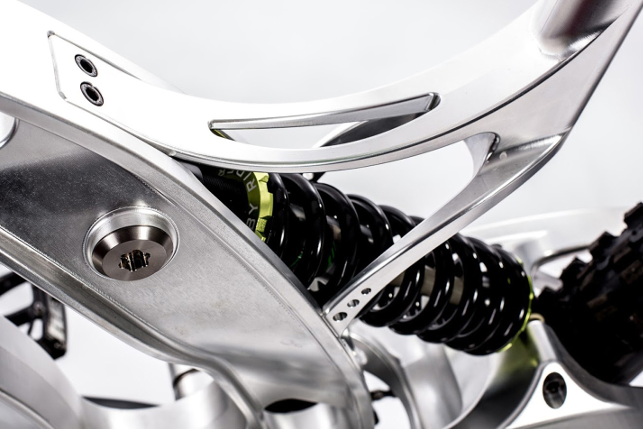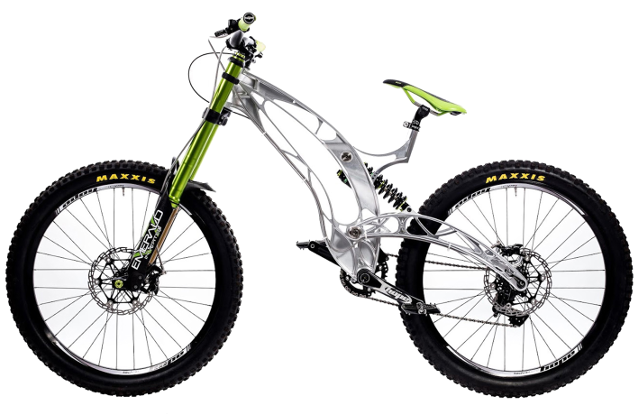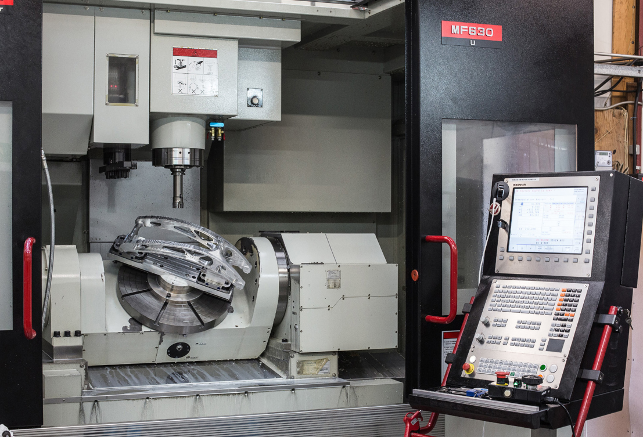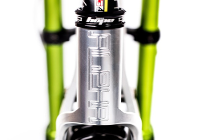
A close-up on the Alpha Bike, created using HyperMill
As a fifth-generation engineer, Stewart Palmer knew from a young age the path his career would take. As a child, he was always more interested in dismantling his bike to find out how it worked than in riding it. Today, as a highly skilled engineer, he’s spent the last 18 months designing and manufacturing his own downhill mountain bike.
Palmer’s engineering pedigree was earned as a programmer and machinist of Formula 1 (F1) components and high-performance engines.
However, the dream of designing his own product didn’t occur to him until he joined North Bucks Machining (NBM), the company started by his own parents back in 2011.
The brainchild of his father, NBM was established when Dave Palmer was made redundant from his machining position at a blow mould outfit producing plastic packaging products. Dave and his wife started out with a HAAS machining centre and eventually brought son Stewart and daughter Jo-Anne into the business, with the goal of taking NBM to the next level.
Reflecting back on the early days of the business, Stewart Palmer says: “The business rapidly became successful in the 3-axis machining arena, but a contract to design and manufacture eight mould tools for 5-litre jerry cans meant we had to invest in technology. I previously worked at a prestigious company producing 5-axis F1 parts, so my ambition was always to evolve [NBM] into the 5-axis market.”
Delivering on that plan involved investing in a Quasar 5-axis machining centre from Engineering Technology Group (ETG), along with high-end CAM software package HyperMill from Open Mind Technologies.
Says Palmer: “I had a great relationship with ETG and, from previously working with an F1 component manufacturer, I knew HyperMill from Open Mind was the only option with regards to CAM software.”
He continues: “High-end CAM software can be an expensive outlay for a small business with just six staff and a few HAAS 3-axis machining centres, but if you can comprehend the potential benefits, it’s a no-brainer.

The Alpha Bike from NBM, the brainchild of biking enthusiast and engineer, Stewart Palmer
My family took some convincing, but the penny dropped when we had to produce a knife blade for a box-folding company.
Using our previous CAM system was a struggle that made this relatively easy re-modelling task a two-hour job. I convinced the family of the benefits of Open Mind’s HyperMill and as soon as we bought it, I modelled the next knife tool in just 10 minutes. Everyone was immediately convinced.”
Palmer’s background in designing and producing complex parts soon gave the biking enthusiast the idea of designing his very own bike. In his spare time, he created numerous drafts of his first bike design, eventually taking the concept to Laser Scanning, a design agency that developed a 3D CAD model from his sketches.
From this 3D CAD model, comprehensive Finite Element Analysis (FEA) was conducted to put shocks, loads and particular stresses on the frame design. Once the 3-piece frame design had passed the simulated stress testing, the NBM team set about machining the company’s first bike.
The aim of the design was to improve the strength and structural integrity of a mountain bike. As Palmer explains: “Standard bikes are produced from hollow tubes that are fabricated together. This design automatically has weak points on every weld seam.

NBM’s 5-axis Quasar Machine producing frames for the Alpha Bike
“To reduce weight, we realised we couldn’t machine hollow tubes, so we used solid aluminium billets and i-beam technology to scallop out the sides of the frame to reduce mass. We calculated that we could machine our rib thicknesses down to 5mm, whilst retaining structural integrity,” he says.
The bike design consists of three core features, the main frame, the seat post and the swing arm that connects the main frame to the rear wheel and suspension.
To emphasise the level of machining required, the main frame is machined from a 100kg aluminium billet down to a 4.5kg frame. The seat post, meanwhile, starts as a 15kg billet and ends as a 250 gram part and the swing arm is machined from a 50kg billet down to a 2kg part. That leaves an aluminium frame of less than 7kg from an overall billet weight of 165kg.
This may appear a costly and time-consuming method of production, but the NBM team investigated waterjet cutting and found that the time and costs involved would be pretty similar. Above all, the aim was to prove the concept and manufacture the best possible product.
Using Open Mind’s HyperMill, the frame is machined in 40 hours, the swing arm in 18 hours and the seat post in 15 hours. However, with just two frames produced to date, time is not the key issue for NBM.
Says Palmer: “At this early stage, the machining time is not the key issue, it’s the surface finishes. Once this frame is machined, it has no secondary hand finishing – it’s ready for final assembly or shipping. It’s all about delivering an aesthetically perfect bike to the customer.” To this end, HyperMill has been in a class of its own.
Without this software, and the 5-axis Quasar machine, says Palmer, the project would have been impossible. What sets HyperMill apart, he adds, is its finish machining cycles.
“HyperMill automatically groups together the Z-level finishing and ‘profile finishing’ cycles to blend perfectly between two surfaces and the two separate cycles. This is critical for our ambitions of the perfectly finished frame.”
“Furthermore, the frame has a lot of pocket machining, so naturally there is a radius left at the bottom of each pocket by the cutting tool.”
In order to resolve this, HyperMill has a ‘pencil milling’ feature that can isolate all the remaining fillets for remachining.
The machine then selects a small tool, which removes the excess material in the corner of each pocket.
While the project in still in its infancy, Palmer has ambitions of further enhancing the design of the frame to reduce the overall weight from 6.75kg to approximately 5kg.
With his background in F1 design & production, getting the frame to shed a few grams as it progresses should come as second nature to him.
The team at NBM is now hoping that the three-part frame and rear-suspension unit will retail at around £7,000, while a completely built, top-specification Alpha Bike will cost mountain biking enthusiasts in the region of £10,000.
NBM races ahead with HyperMill CAM software
Default






